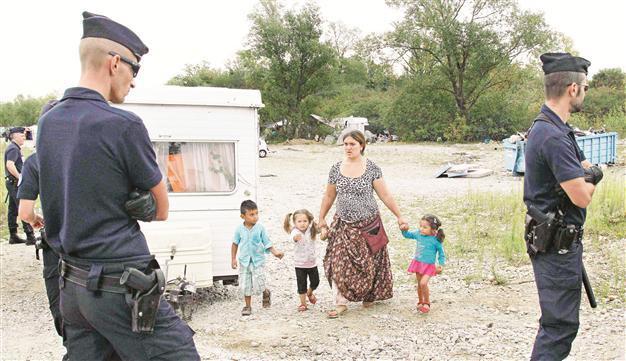Hate crime becomes ‘daily routine’ in EU, says report
BRUSSELS

French police stand in an illegal camp housing 114 Roma as they start to evacuate in Lyon in this photo. a recent report shows many hate crimes are invisible, as victims are reluctant to report them. REUTERS photo
Hate crime is a daily reality but is mostly invisible throughout the European Union, according to a recent report released by the 27-member union’s agency for fundamental rights.
Many hate crimes, motivated by racism, xenophobia, religious intolerance or by a person’s disability, sexual orientation or gender identity, are invisible, as victims and witnesses are reluctant to report them, said the report released on Nov. 27 by the EU’s Fundamental Rights Agency (FRA).
The report calls on member states to encourage victims and witnesses to report these crimes and to increase confidence in their justice systems to deal with them decisively and effectively, so that these crimes may become more visible and addressed more effectively.
One out of five Turks living in EU countries was the victim of at least one crime in the past 12 months, another FRA report titled “Minorities as Victims of Crime” said. This rate was 33 percent for Sub-Saharan Africans and 32 percent for Roma, 26 percent for North Africans, 24 percent for Central and Eastern Europeans and 17 percent for respondents with a Russian background.
Most of the minority and immigrant groups in the EU tend not to report such crimes, because of their lack of confidence in the police being able to do anything about them and the perception that incidents were too trivial to be worth reporting.
Most Turkish victims ‘do not report’ hate crimesAmong the Turkish respondents, 74 percent do not report assault or threats against them, while 90 percent do not report serious harassment. For ex-Yugoslav respondents, 57 percent do not report assault or threats against them while 75 percent do not report serious harassment.
Immigrants were found to be the most likely to have been the victims of hate crime, with a 10 percent victimization rate against 2 percent among non-immigrants, according to surveys cited by the report, titled “Making hate crime visible in the European Union: Acknowledging victims’ rights.”
Immigrants in Belgium, Greece, Spain and Denmark report hate crimes most often, according to the report, while immigrants in Finland, Portugal and Italy reported such crimes least often.
On average, 18 percent of all Roma and 18 percent of all sub-Saharan African respondents indicated that over the past 12 months they had been subjected to hate crimes, assault, threats or serious harassment that they considered “racially motivated in some way.”
The groups with the highest perceived rates of racially motivated hate crimes were the Roma in the Czech Republic, Greece, Hungary, Poland and Slovakia; Somalis in Finland and Denmark; and Africans in Ireland, Italy and Malta.
In fighting hate crime, the report said action was needed on three levels: legislation, policy and practice.
